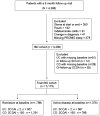Sleep disturbance and risk of active disease in patients with Crohn's disease and ulcerative colitis
- PMID: 23376797
- PMCID: PMC3659204
- DOI: 10.1016/j.cgh.2013.01.021
Sleep disturbance and risk of active disease in patients with Crohn's disease and ulcerative colitis
Abstract
Background & aims: Impairment of sleep quality is common in patients with inflammatory bowel diseases (IBDs) (eg, Crohn's disease [CD] and ulcerative colitis [UC]), even during clinical remission. Sleep impairment can activate inflammatory pathways. Few prospective studies have examined the role of sleep disturbance on risk of relapse in IBD.
Methods: We analyzed data from 3173 patients with IBD (1798 in clinical remission at baseline) participating in the Crohn's and Colitis Foundation of America Partners study, a longitudinal, Internet-based cohort. Sleep disturbance was measured using a subset of questions from the Patient Reported Outcomes Measurement Information Systems sleep disturbance questionnaire. Disease activity was assessed using the short Crohn's Disease Activity Index and the simple clinical colitis activity index for CD and UC, respectively. Logistic regression was used to identify predictors of sleep quality and examine the effect of sleep quality at baseline among patients in remission on risk of active disease at 6 months.
Results: Disease activity, depression, female sex, smoking, and use of corticosteroids or narcotics were associated with sleep disturbance at enrollment. Among 1291 patients whose CD was in remission at baseline, those with impaired sleep had a 2-fold increase in risk of active disease at 6 months (adjusted odds ratio, 2.00; 95% confidence interval, 1.45-2.76); however, no effect was observed in patients with UC (odds ratio, 1.14; 95% confidence interval, 0.75-1.74). These findings persisted in a number of sensitivity analyses.
Conclusions: Sleep disturbance was associated with an increased risk of disease flares in CD but not UC. These findings indicate that the evaluation and treatment of sleep disturbance in patients with CD might improve outcomes.
Keywords: CCFA; CD; CI; Crohn's and Colitis Foundation of America; Crohn's disease; DSS; Environment; IBD; IL; Intestinal Inflammation; OR; PROMIS; PSQI; Patient Reported Outcomes Measurement Information Systems; Pittsburgh Sleep Quality Index; Prospective Cohort Study; SCCAI; SCDAI; Short Crohn's Disease Activity Index; Simple Clinical Colitis Activity Index; TNF; UC; confidence interval; dextran sodium sulfate; inflammatory bowel diseases; interleukin; odds ratio; tumor necrosis factor; ulcerative colitis.
Copyright © 2013 AGA Institute. Published by Elsevier Inc. All rights reserved.
Conflict of interest statement
Figures
Comment in
-
Time to awaken to issues of sleep and inflammatory bowel disease: there are many unanswered questions.Clin Gastroenterol Hepatol. 2013 Aug;11(8):972-4. doi: 10.1016/j.cgh.2013.04.012. Epub 2013 Apr 16. Clin Gastroenterol Hepatol. 2013. PMID: 23602823 No abstract available.
References
-
- Loftus EV, Jr, Sandborn WJ. Epidemiology of inflammatory bowel disease. Gastroenterol Clin North Am. 2002;31:1–20. - PubMed
-
- Bernstein CN, Loftus EV, Jr, Ng SC, Lakatos PL, Moum B. Hospitalisations and surgery in Crohn’s disease. Gut. 2012;61:622–9. - PubMed
-
- Hommes D, Colombel JF, Emery P, Greco M, Sandborn WJ. Changing Crohn’s disease management: need for new goals and indices to prevent disability and improve quality of life. J Crohns Colitis. 2012;6 (Suppl 2):S224–34. - PubMed
-
- Cosnes J, Gower-Rousseau C, Seksik P, Cortot A. Epidemiology and natural history of inflammatory bowel diseases. Gastroenterology. 2011;140:1785–94. - PubMed
Publication types
MeSH terms
Grants and funding
LinkOut - more resources
Full Text Sources
Other Literature Sources
Medical


